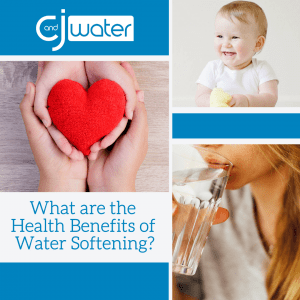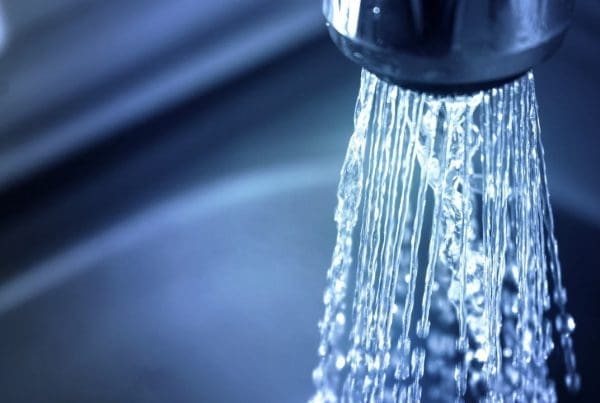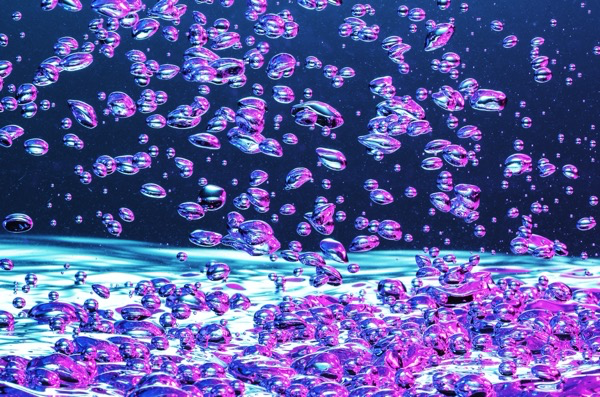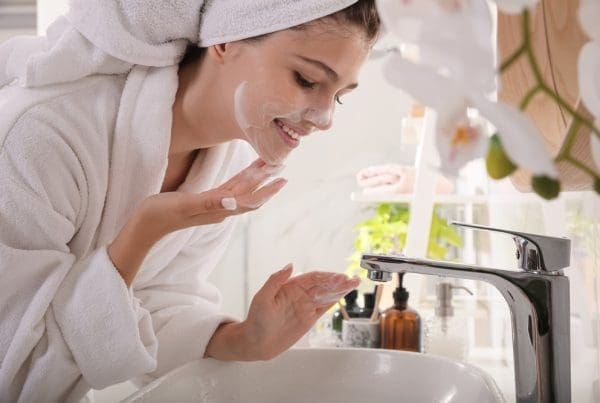How Water Softening Can Benefit Your Health
As mentioned in a previous blog, soft water can actually save you time and money, but does it have any physiological benefits over hard water? The answer is yes, and in this post, we will discuss the health benefits of soft water as well as water treatment options for your home.
How Does a Water Softener Work?
First off, let’s remind ourselves of what hard water is, and how a water softener works. Falling rainwater is naturally weakly acidic, thanks to the reaction of water and carbon dioxide in the atmosphere. When the rain falls, it passes through layers of rock, and minerals — usually calcium or magnesium compounds — from the rock dissolve into the water. Indiana has extremely hard water, which causes all sorts of problems to your appliances, faucets, sinks, tubs, and showerheads.
A typical water-softening system removes calcium and magnesium ions from hard water and replaces them with sodium ions—ion exchange. Calcium and magnesium ions interfere with the action of household soaps and detergents, but sodium does not. Your water softener unit is usually located in your household plumbing near the place where water enters the house. This is so that it softens the water used for drinking and washing. The unit contains several cubic feet of porous plastic resin covered with molecules that attract and bind to positive ions dissolved in the water.
Normally, sodium-positive ions coat the resin. However, since water flows over the resin on its way to your sink or washer, the naturally occurring calcium, and magnesium positive ions that exist in hard water stick to the resin. This releases sodium ions into the water in order to maintain a balance of electrical charge on the resin. Gradually, most of the sodium ions are released into the household water. The resin becomes saturated with calcium and magnesium ions.
What Are the Benefits?
While hard water isn’t necessarily a health concern, removing these hardness minerals can result in several health benefits:
Healthier Skin—Hard water interacts poorly with soap so, instead of a rich, dense lather, it produces an unpleasant film. That film can accumulate on the skin, causing a variety of aesthetic and health challenges.
And the more soap you try to use to cut through the sticky film, the more problems you may have.
This sticky film can block pores, leading to breakouts. Your skin may become dry and feel sticky to the touch. Also, you may feel like you can never get your skin truly clean.
Even rinsing will not dissolve this mixture. Instead, the film will remain and clog your pores, which causes bacteria to grow. Which leads to rash development, skin irritation, and dry and itchy skin.
The use of hard water on the skin can even cause acne. It is recommended that you wash your face with bottled, distilled, or soft water instead.
Rinsing with hard water can also lead to the development of eczema. In one study, it was determined that those who used hard water on their skin were 50% more likely to develop eczema than those who used soft water.
In another eczema study, which involved children participants, it was found that 91% of children who received a water softener in their home noticed that they were less itchy. 83% of the parents reported that the severity of their rashes or eczema decreased and 67% of the group were using fewer medications for eczema.
Bottom Line: Bathing in soft water is better for your skin than hard water. With hard water, calcium and magnesium can mix poorly with soap to cause buildup which clogs pores and leaves a film on the skin. Washing your skin with soft water will clear up acne and prevent rashes and eczema. Both children and adults with sensitive skin may develop eczema as a result.
Soft water is not considered a cure for eczema. There’s still evidence needed to prove it is an effective preventive measure. But, this recent research supports the idea that soft water may be much better for skin than hard water. Because a water softener removes calcium and magnesium from your home’s water, it is ideal for bathing and won’t cause skin irritation like hard water can.
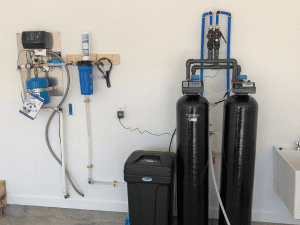 Stronger Hair—When you have hard water, you never seem to have enough shampoo. No matter what brand you use – or how much money you invest in hair products – you’ll never get that rich lather with hard water. Your hair never quite feels clean after a shower either. Heavy minerals also dull the hair and dries it out, causing scalp problems like dandruff. With a softener system, you will enjoy shiny, vibrant hair and a healthy scalp all year long.
Stronger Hair—When you have hard water, you never seem to have enough shampoo. No matter what brand you use – or how much money you invest in hair products – you’ll never get that rich lather with hard water. Your hair never quite feels clean after a shower either. Heavy minerals also dull the hair and dries it out, causing scalp problems like dandruff. With a softener system, you will enjoy shiny, vibrant hair and a healthy scalp all year long.
Less Work for Your Kidneys—The primary minerals responsible for hard water are carbonate and sulfate salts of calcium and magnesium. When you drink this from the tap, these minerals proliferate in the body. Consequently, the regular consumption of hard water can lead to an increase in urinary calcium and magnesium levels. This can, in turn, can lead to the formation of urinary or kidney stones. Softened water, on the other hand, does not contribute to the formation of kidney stones.
Soft water leads to better hydration—You know the importance of staying hydrated but, when your water tastes nasty, it can be a chore to drink the recommended 2.7 liters per day that the research says our bodies need. When you add a softener system, however, you improve the appearance, smell, and flavor of your home’s water. This ensures that you will always enjoy a clean, clear, and refreshing glass straight from the tap. No lugging bottles or paying a fortune for delivery.
C and J Water’s treatment professionals can visit your home, conduct a water quality analysis, and recommend the best solution for the hard water in your home.


